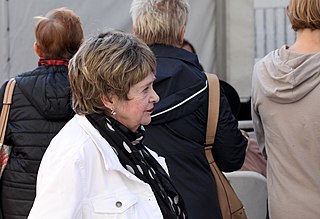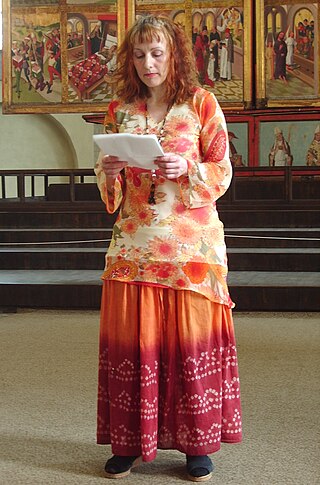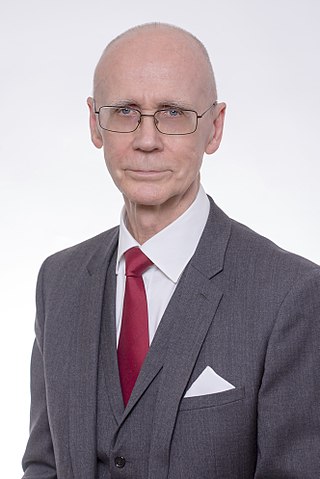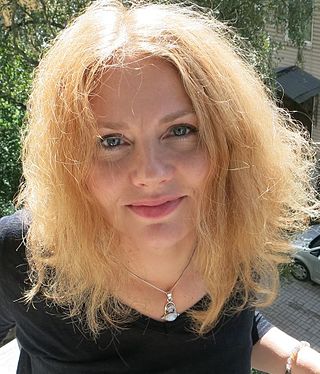
Jüri Talvet is an Estonian poet and academic. He is the author of various literary works including poetry, criticism, and essays.

Andrus Kivirähk is an Estonian writer, a playwright, topical satirist, and screenwriter. As of 2004, 25,000 copies of his novel Rehepapp ehk November had been sold, making him the most popular 21st-century Estonian writer. His book Mees, kes teadis ussisõnu (2007) has been one of the top selling books in Estonia. He has been a member of the Estonian Writers' Union since 1996.
Kersti Merilaas was an Estonian poet and translator. In addition, she wrote poems and prose for children and plays.

Tarmo Teder is an Estonian writer, poet and critic.

Leelo Tungal is an Estonian poet, children's writer, translator, editor and librettist.

Ketlin Priilinn is an Estonian writer and translator. She has written a number of books for children, young adults and adult readers. She has also translated four novels from English into Estonian. Ketlin Priilinn is a member of Estonian Writers’ Union (EWU).
Jüri Kallas is an Estonian science fiction expert, translator, publisher and editor. Jüri Kallas has worked for publishers Elmatar and Fantaasia as a compiler and editor. He is currently working on handing out the Estonian Science Fiction Association award Stalker, developing the Estonian science fiction bibliography and is an active contributor for the online science-fiction magazine Reaktor. He has written afterwords for novels and collections. He has translated into Estonian texts by Vladimir Arenev, Alexander Belyaev, Kir Bulychev, Robert E. Howard, Rafał Kosik, Henry Kuttner, H. P. Lovecraft, H. L. Oldie, Viktor Pelevin, Alexandr Siletsky, Mikhail Uspensky, Ilya Varshavsky and others. In addition, Jüri Kallas has worked for different publishers, choosing and editing dozens of crime and romance novels and written forewords for them. He has also published literature criticism and his views and opinions about current political events in Estonia. He has been an editorial board member of the online magazine Algernon.

Aime Hansen is an Estonian poet, writer, and artist. She is noted for her works with religious themes and her exploration of the mysticism of life and psychology. In 2009 she authored Jaipur-Delhi-Himaalaja: reisikohvrist leitud lood, a short story collection related to her travels in northern India and the Himalayas. A member of the Estonian Writer's Union, she writes in both Estonian and English.

Piret Raud is a contemporary Estonian author and illustrator.

Kalle Kurg is an Estonian poet, writer, critic, translator and editor. As a versatile figure in Estonian culture, he has also published caricatures and worked as a theatre director.
Kairi Look is an Estonian children’s writer and author of short prose.

.
Aino Pervik is an Estonian children's writer, and translator.

Kätlin Vainola is a contemporary Estonian children’s writer and poet. She sometimes uses the pen name Marie Myrk.

Liisi Ojamaa was an Estonian poet, translator, literary critic and editor. She was already known for her debut collection "Endless July", which was included in the collection "Poetry Cassette '90"; Elo Vee, Triin Soomets, Ats and Ruth Jyrjo also made their debut on the tape.
Paul Rummo was an Estonian poet, playwright, and literary critic.

Timo Maran is an Estonian biosemiotician and poet. He has remarkably contributed to zoosemiotics and ecosemiotics.

Juhan Maiste is an Estonian art historian.

Jaan Unt was an Estonian classical philologist, translator, and literary scholar. He translated from Ancient Greek, Latin, and Russian.
Alo Hoidre was an Estonian painter, book illustrator, and printmaker.














